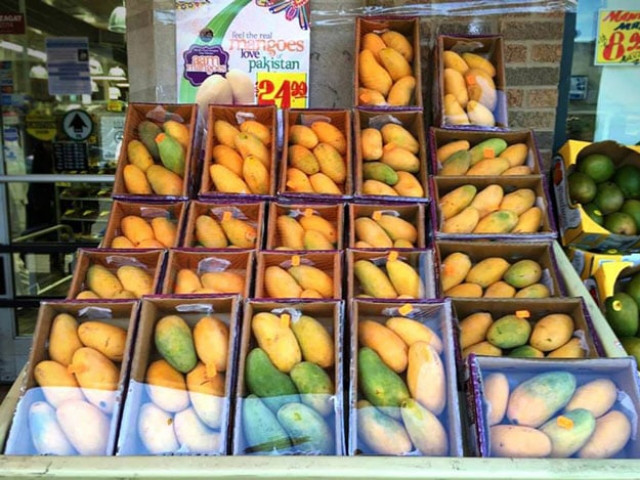Mango exporters blame airlines for losses
Say they delay shipments, charge exorbitant freights

Mangoes. PHOTO: US Consulate General Karachi
Airlines, mostly foreign companies, are utilised for quick shipments of mango export orders. However, not only do they charge exorbitant freights, but several times they become a cause of the exports’ failure, All Pakistan Fruit and Vegetable Exporters, Importers and Merchants Association (PFVA) Patron-In Chief Waheed Ahmed told The Express Tribune.
Mango festival planned in Multan
For instance, foreign airlines charge on an average Rs175 per kilogram to transport mango to Manchester from Karachi and Rs175 per kilogram to London. In comparison, the same airlines charges only Rs85 (PKR) to transport one kilogram mango to Manchester from Bombay and Rs120 per kilogram to London from the Indian city.
“There is no huge difference between the destinations [Manchester and London] from Karachi and Bombay. However, there is a huge different in freight charges. Why?” he questioned.
“This is open discrimination against Pakistan. India is our only one regional competitor,” said Ahmed. The high transportation rate charged by airlines only applies to mango, as otherwise the rate is Rs90 per kilogram for other fruits and vegetables from Pakistan, the official added.
Despite the high delivery rates, airlines are mishandling transportation of the export orders, said Ahmed. “Most of the times, the export order is delivered lesser in weight than the dispatched one.”
Besides, the airlines under question consume higher transportation and delivery time than they commit.
Mango is a perishable item; hence it is air-lifted to save transportation time and save it from decay. However, many times the airlines take longer transportation and delivery time which cause decay of the fruit causing the overseas buyers to reject the orders. In this case, the export delivery orders are sent back to Pakistan at additional freight cost on the return flight, he lamented.
Pakistani Mango: ‘Exports rise as standards maintained’
The PFVA patron-in-chief said a trader ended an export order that resulted in a loss of billions. Narrating the incident, he said the exporter had dispatched 3,000 tons to a European country at a freight cost of over Rs1 million. However, the shipment was rejected by the international buyer. The airline charged another Rs0.8 million for the return. Authorities at Karachi airport declared the returned shipment as non-consumable and charged the trader another Rs0.3 million for disposal.
The airlines cannot be charged for the losses, as they do not accept the liability. Pakistan International Airlines is the only domestic airlines which airlifts mango, but its share in total air shipment has shrunk.
PFVA has set an export target of 100,000 tons worth an estimate of $75 million for the current season (May to August). “Some 15-20% of this is airlifted,” he said.
CCP to probe airlines
Ahmed said PFVA along with Air Cargo Agents Association of Pakistan (ACAAP) have approached the Competition Commission of Pakistan (CCP) to probe and take action against the airlines.
They lodged complaints against the airlines ahead of the mango export season this year. CCP director general has summoned the complainers on Monday.
“They discussed matters of higher freight rates being charged by foreign carriers on perishable commodities, especially mango shipments to European destinations, Middle East and the US,” a press statement from PFVA added.
Published in The Express Tribune, July 13th, 2017.
Like Business on Facebook, follow @TribuneBiz on Twitter to stay informed and join in the conversation.



















COMMENTS
Comments are moderated and generally will be posted if they are on-topic and not abusive.
For more information, please see our Comments FAQ